The Tragedy of Saul's Suicide
Comments for Study 12
Pick to read this Bible passage in a separate window.
A MAP OF THE UNITED KINGDOM OF ISRAEL
MAPS OF ISRAEL AND JUDAH
A MAP OF THE DIVISION OF CANAAN
A MAP OF DAVID'S ESCAPE FROM SAUL AND BATTLE AT GILBOA
A MAP OF DAVID'S CONQUESTS
A LIST OF ISRAEL'S JUDGES
OLD TESTAMENT BOOKS TIMELINE
A LIST OF ISRAEL'S KINGS AND PROPHETS
A TIMELINE OF ISRAEL'S HISTORY
Saul and David in this study are in the same type of situations; the lonely leader standing before an enemy that they believe will kill them, their families, and followers. David and Saul dealt with their desperate situation differently. How do we react when our backs are against a wall and a knife is at our throats is important to God. Either our faith in the Lord will fail and we will come to ruin, or we will overcome and grow in faith in God and his wisdom.
I. David Among the Philistines (27:1-28:2)
>1. Where did David go after this? (1-4)
* 1 Samuel 27:1-4 "But David thought to himself, "One of these days I will be destroyed by the hand of Saul. The best thing I can do is to escape to the land of the Philistines. Then Saul will give up searching for me anywhere in Israel, and I will slip out of his hand." So David and the six hundred men with him left and went over to Achish son of Maoch king of Gath. David and his men settled in Gath with Achish. Each man had his family with him, and David had his two wives: Ahinoam of Jezreel and Abigail of Carmel, the widow of Nabal. When Saul was told that David had fled to Gath, he no longer searched for him."
* "David though to himself" -David was a lonely hard pressed leader at this time. In his heart David believed that he would be killed by Saul if things did not change. The Lord had promised to make him king and many people including Saul reminded him that. Yet, David did not now when that would happen. He was running so far and for a long time, a life he later looked as something he never wanted to go back to choosing famine over it. (2 Sam. 24:13-15) Have you ever gotten to a point where you were in a situation where you were sure of the Lord's love for you and sure of a the promises of God for the future, and yet knew that if something would change you destruction was eminent? I have and perhaps now being unemployed for almost a year. Yet every bone in my body agrees what the Lord has been saying to me and others, the end times that Daniel and John wrote about will happen very soon, in my lifetime. Does that encourage me? Yes for it is sure that I will be with the Lord. Until that time, I am like David, knowing that if something doesn't change soon personal trouble awaits me.
* "I will be destroyed by the hand of Saul" -David believed something had to change.
* "The best thing I can do" -David was tired of hiding in caves, being in hands length of Saul, showing his enemy kindness, not knowing where the next meal would come from, having no place to lay his head, and running -always running.
* "escape to the land of the Philistines" -Though part of the promised land (Josh. 15:31, 19:5), is essence David was leaving his homeland and the people of the promise. David must have been sad.
* "Achish son of Maoch king of Gath" -David had went to Achish before, became afraid and acted like a madman. (21:10-15)
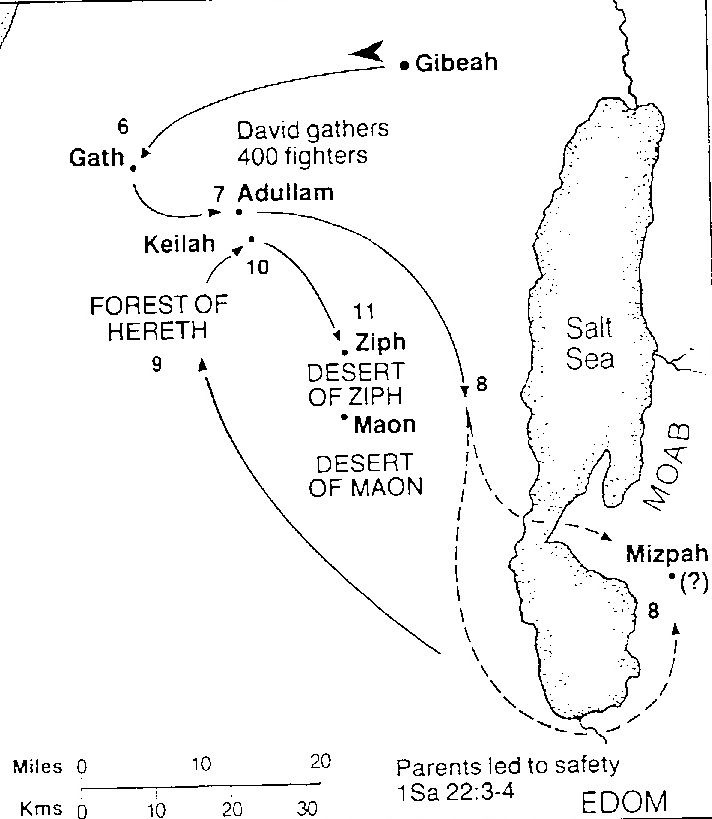
>How did he come to live in Ziklag? (5-7)
* 1 Samuel 27:5-7 "Then David said to Achish, "If I have found favor in your eyes, let a place be assigned to me in one of the country towns, that I may live there. Why should your servant live in the royal city with you?" So on that day Achish gave him Ziklag, and it has belonged to the kings of Judah ever since. David lived in Philistine territory a year and four months."
* "in one of the country towns" -David did not want to live in Gath. A man of God would be troubled by living so close to those not under the covenant, the godless.
* "your servant" -David was so tired of his exiled life that he was willing to become the servant of his and Israel's enemy.
* "Ziklag" -Ziklag in Saul and David's time was on the boarder of Judah and Philistine territory. In Joshua's time it had been conquered by Simeon and was part of the promised land. Simeon must have lost it by David's time to raiding parties like those mentioned here.
* "Achish gave him Ziklag" -David seemed to be asking for Ziklag. Either way it was a wise choice, beneficial to David and Achish. Neither the Philistines or Saul would attack him and he would also have freedom to do what he seemed to plan to do. For the Philistine, David would protect his southern boarder towns for terrorists. Some have said that David falters in his faith. Can this viewpoint be seen in the result of moving to Ziklag? He did find some rest and he gained Ziklag for his descendants. It is true that David was put in a precarious situation with Israel and Ziklag was attacked. Yet the Lord delivered David from both. Also, whether in Israel running from Saul or in Ziklag David experienced trouble and hardship up to this point. Does the Lord rebuke him? Some of Saul's relatives, Benjamites, left Saul and joined David in Ziklag. (1 Chron. 12:1-2) Brave men from Manasseh also joined him. (1 Chron. 12:20) 1 Chronicles 12:22 states, "Day after day men came to help David, until he had a great army, like the army of God."
* The text does not say that David inquired of the Lord, though he may have since it was his custom.
* "it has belonged to the kings of Judah ever since" -Either this note was added after 1 Samuel was written, or this section of 1 Samuel was written later by the prophet Gad (1 Chron. 29:29) after Samuel (25:1) and David died after forty years of being king -seven in Hebron and thirty-three in Jerusalem (1 Chron. 29:26-28).
* "a year and four months" -The Philistines might have saw David and other men defecting from Saul and Israel and even believed that Judah supported them to the point of deciding to attack Israel. Over a year would have been enough to ensure David's support and plan the attack. If true, Saul chasing David led to his own death.
* 1 Chronicles 12 records many Israelite warriors defecting Saul and going to David in Ziklag and then in Hebron.
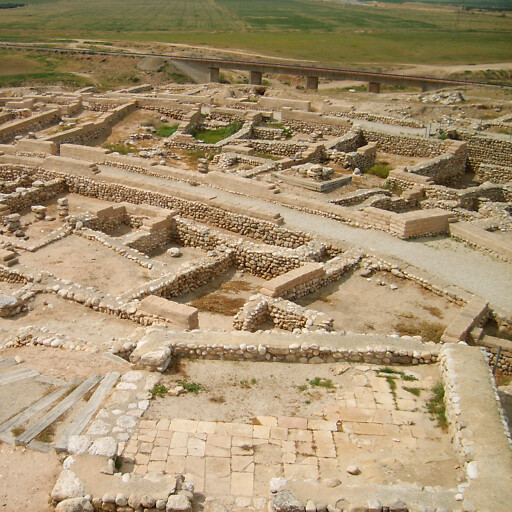
* See pictures of Ziklag ruins to the right. The exact location of Ziklag is debated. Most believe it was here. Daivd final refuge from Saul was in Ziklag.
>How did he convince Achish the Philistine that he was a friend and ally?
* 1 Samuel 27:8-12 "Now David and his men went up and raided the Geshurites, the Girzites and the Amalekites. (From ancient times these peoples had lived in the land extending to Shur and Egypt.) Whenever David attacked an area, he did not leave a man or woman alive, but took sheep and cattle, donkeys and camels, and clothes. Then he returned to Achish. When Achish asked, "Where did you go raiding today?" David would say, "Against the Negev of Judah" or "Against the Negev of Jerahmeel" or "Against the Negev of the Kenites." He did not leave a man or woman alive to be brought to Gath, for he thought, "They might inform on us and say, 'This is what David did.'" And such was his practice as long as he lived in Philistine territory. Achish trusted David and said to himself, "He has become so odious to his people, the Israelites, that he will be my servant forever."
* "Geshurites" -The Lord had given their land to the Israelites. "When Joshua was old and well advanced in years, the Lord said to him, 'You are very old, and there are still very large areas of land to be taken over. This is the land that remains: all the regions of the Philistines and Geshurites:'" (Joshua 13:1-2)
* "Girzites" -Not mentioned elsewhere in the Bible. Not listed in any Bible dictionary or commentary either.
* "Amalekites" -The Lord commanded Saul to kill all the Amalekites. He did destroy their main city. (1 Sam. 15) However, some escaped his sword. David is finishing up what Saul should have been doing instead of hunting down David.
* "he did not leave a man or woman alive" -David did this to protect himself.
* "was his practice as long as he lived in Philistine territory" -David lied to obtain trust from his enemy.
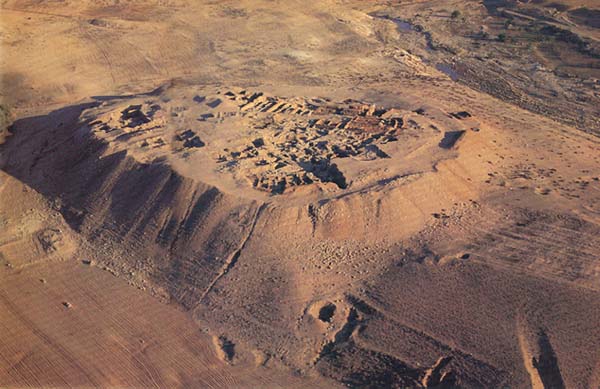
>What can be learned?
* Jesus told his disciples when he sent them out during his Galilean ministry, "I am sending you out like sheep among wolves. Therefore be as shrewd as snakes and as innocent as doves." (Matt. 10:16) David seems to be living like this.
* Jesus taught a challenging parable about a shrewd manager. He said, "The master commended the dishonest manager because he had acted shrewdly. For the people of this world are more shrewd in dealing with their own kind than are the people of the light. I tell you, use worldly wealth to gain friends for yourselves, so that when it is gone, you will be welcomed into eternal dwellings. Whoever can be trusted with very little can also be trusted with much, and whoever is dishonest with very little will also be dishonest with much. So if you have not been trustworthy in handling worldly wealth, who will trust you with true riches? And if you have not been trustworthy with someone else's property, who will give you property of your own?" (Luke 16:8-12)
>2. What problem had David gotten himself in? (1a)
* 1 Samuel 28:1a "In those days the Philistines gathered their forces to fight against Israel."
* David had been deceiving the Philistine ruler of Gath to keep away from Saul's spear. When the Philistines decide to attack Israel, David will either trust in the Lord for deliverance or find another way out. Several times in my life has caused me to relate to David's situation.
* Saul must have at first decided that David had abandoned the God of Israel when David went to the Philistines for help and protection. He must have been told that the Lord had freed him of David. Then over a year later he was told that David and the Philistines are going to attack him.
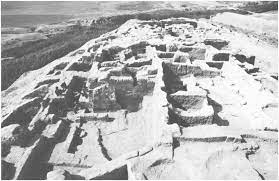
>How did he manage? (1b-2)
* 1 Samuel 28:1b-2 "Achish said to David, "You must understand that you and your men will accompany me in the army." David said, "Then you will see for yourself what your servant can do." Achish replied, "Very well, I will make you my bodyguard for life."
* "You must understand" -Achish was determining if David would be loyal to him in battle.
* "your servant" -David kept the illusion of loyalty.
* "you will see for yourself what your servant can do" -David did not promise or say directly that he would fight against Israel. He knew that since Achish wanted to believe in David, he would.
* "I will make you my bodyguard for life" -Achish pleaded lifetime loyalty and trust in David, though David never does except calling himself Achish's servant.
* David must have believed that he had made a good decision and had acted wisely in solving several problems at once. Even when another decision needed to be made, David stuck with his original decision. All he could do is to wait to see what the Lord was going to do. He would have had no idea that soon Saul would be dead and he would be king of Judah in Hebron.
* The Lord had promised David kingship when he was a young teenager. The Lord had promised Israel that he would protect his people with strong support (10). The Lord kept his promise through David.
David did not accomplish and maintain strong support for Israel on his own. He had a group of men appointed as leaders of the army. The leaders of men were assigned based on their ability and courage. None of David's brothers, cousins or uncles were given special places. When a man proved himself David gave him rank.
A great leader doesn't need to be skilled in everything. He only needs to have at least one great skill. Recognize the gift, skill, and potential that God gives someone else and place them in the right position so that gift can be used for God's greater good. David had this skill.
Three of David's showed great devotion to David (15-19). They risked their lives to bring David a drink of water. David poured it out because he recognized that he is not worthy of such devotion and makes the water a drink offering to the Lord. A great leader does not desire self-glory and adoration. A great leader seeks others to admire the Lord's glory and gives the Lord adoration.
David was a great leader. Yet, Jesus is the best example of a leader. He appointed others to carry out the work of the gospel. Jesus was subject to God his Father and showed his followers how to respect his Father. He chose twelve and trained them. Each had a skill that was best for a specific task. No two were alike. Jesus also did not show favor to his brothers.
II. Saul and the Witch of Endor (28:3-15)

>3. What problem did Saul have? (3-6)
* 1 Samuel 28:3 "Now Samuel was dead, and all Israel had mourned for him and buried him in his own town of Ramah. Saul had expelled the mediums and spiritualist from the land. The Philistines assembled and came and set up camp at Shunem, while Saul gathered all the Israelites and set up camp at Gilboa. When Saul saw the Philistine army, he was afraid; terror filled his heart. He inquired of the Lord, but the Lord did not answer him by dreams or Urim or prophets."
* "Samuel was dead" -Even when Samuel was alive Saul did not seek him out even though they lived less than a days walk apart.
* "Saul had expelled the mediums and spiritualist from the land" -Saul had a sense of right and wrong. What he did here was good, according to the law. (Lev. 19:31, 20:6, 27; Deut. 18:11) Many of Israel's kings did not do this and the Lord severely rebuked them for it.
* "Shunem" -Town in tribal territory of Issachar (Josh. 19:18). Shunem is modern Solem on the southern edge of the Nebi Dachi across from Mount Gilboa. It is three miles east of Affuleh and three and a half miles north of Jezreel. See map link at the top of this study. (Holman Bible Dictionary)
* "Gilboa" -Mount Gilboa has been identified with modern Jebel Fuqus, on the eastern side of the Plain of Esdraelon. See map link at the top of this study.
* "he was afraid" -Many times as king Saul is stated or shown as being afraid. Fear is the opposite of faith. Samuel had told all Israel, "If you fear the Lord and serve and obey him and do not rebel against his commands, and if both you and the king who reigns over you follow the Lord your God--good! But if you do not obey the Lord, and if you rebel against his commands, his hand will be against you, as it was against your fathers." (1 Samuel 12:14-15) Jesus taught, "I tell you, my friends, do not be afraid of those who kill the body and after that can do no more. But I will show you whom you should fear: Fear him who, after the killing of the body, has power to throw you into hell. Yes, I tell you, fear him. Are not five sparrows sold for two pennies? Yet not one of them is forgotten by God. Indeed, the very hairs of your head are all numbered. Don't be afraid; you are worth more than many sparrows." (Luke 12:4-7)
* "the Lord did not answer him" -Saul for the first time in many years decides to inquire of the Lord. He had put the Lord and the Lord's will off for so long, even directly disobeying and never repenting. Now, when trouble comes he does not admit his guilt and only seeks the Lord's help. We need to confess our sins if we want to have God answer our prayers.
* "by dreams" -All men what to believe that God speaks to them in dreams. Though God does use this, it is not as common as other ways listed in the Bible.
* "Urim" -Revelation through a priest who wore the Urim on the ephod's breast plate. Since the real one was with David, Saul have have made his own. Saul did not have the real one because he killed the priests who had it, eighty-five in all. (22:17-19) Saul had cut off a way that the Lord communicated with his people and then tried to correct it in his own way.
* "prophets" -Samuel had raised up a school of prophets. (19:20) This is the first time that Saul ever sought out a prophet, including Samuel who anointed him. Saul seemed to keep far away from prophets until now, when he was in trouble and afraid.
* Saul was seventy years old, well past the average age in those days. Yet he wanted to hold onto power even now. How long did he plan to live?
>How did he manage? (7-8)
* 1 Samuel 28:7-8 "Saul then said to his attendants, "Find me a woman who is a medium, so I may go and inquire of her." "There is one in Endor," they said. So Saul disguised himself, putting on other clothes, and at night he and two men went to the woman. "Consult a spirit for me," he said, "and bring up for me the one I name."
* "his attendants" -Saul had cast out all the mediums according to Lev. 19:26; and yet even his attendants knew where to find one.
* "Find me a woman who is a medium" -Saul was a religious man with misplaced ideas of worship and service to God's and his calling. He had a misguided passion for God. He turned to pagan practices in his desperation.
* "Endor" -Six miles (10km) north-west of Shunem. (Josh. 17:11) The journey was hard and perilous.
* Saul was not prepared for a battle against the Philistines because he wasted his time, energy, and Israel's national resources on pursuing David.
* The Lord did not answer Saul because he did not obey.
* Saul was hoping to somehow change the pronouncements that was already made.
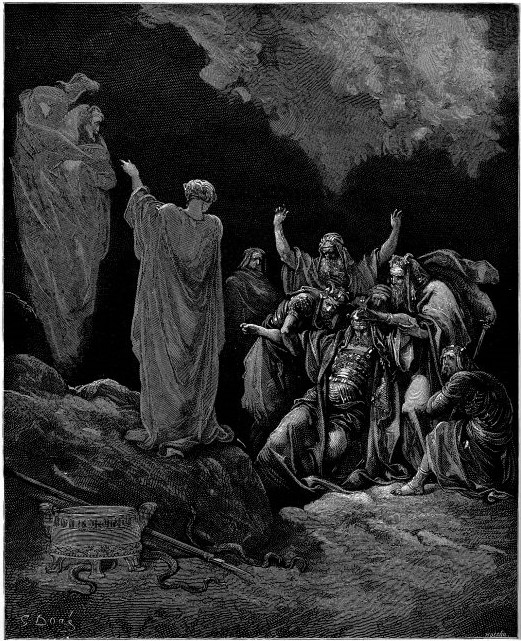
* See a wood engraving by Gustave Dore (1832-1883) to the right depicting Saul and the witch of Endor. Dore's drawings were in Bibles that are now in public domain. This one was scanned in by creationism.org.
>What can we learn about Saul and David about the way they handled their tough situations?
* The Bible commented when Saul was wrong, as we see again and again. Even Saul said he was in error. At this point the Bible never says that David was in the wrong, and all commended him for his actions.
>4. How did he convince her to inquire of Samuel? (9-11)
* 1 Samuel 28:9-11 "But the woman said to him, "Surely you know what Saul has done. He has cut off the mediums and spiritualist from the land. Why have you set a trap for my life to bring about my death?" Saul swore to her by the Lord, "As surely as the Lord lives, you will not be punished for this." Then the woman asked, "Whom shall I bring up for you?" "Bring up Samuel," he said."
* The woman was cautions with strangers indicating that Saul's order to kill mediums and spirits was a standing order that was enforced.
* "set a trap" -Why didn't this woman know of the battle about to take place? Why would fighting aged men be seeking out to enforce this law with such a large battle about to erupt? Paranoia springs from pagan beliefs.
* "Saul swore to her by the Lord" -Very strange that Saul would invoke the name of the Lord before a medium.
>How did Saul and the woman respond when Samuel came? (12-14)
* 1 Samuel 28:12-14 "When the woman saw Samuel, she cried out at the top of her voice and said to Saul, "Why have you deceived me? You are Saul!" The king said to her, "Don't be afraid. What do you see?" The woman said, "I see a spirit coming up out of the ground." "What does he look like?" he asked. "An old man wearing a robe is coming up," she said. Then Saul knew it was Samuel, and he bowed down and prostrated himself with his face to the ground."
* God permitted the spirit of Samuel to come from Sheol. Sheol is in the earth. Sheol was the holding place of all the dead before Jesus died and rose from the dead. After Jesus died he ascended into Sheol and escorted out of Sheol all the faithful. The unbelievers are still in Sheol.
* "What do you see" -Saul could not see the spirit. The woman could because of an evil spirit within her. Some mediums and spiritualist are controlled and indwelt by evil spirits (demons). Through continual sin they interact with each other. Yet the evil spirit cannot act beyond the will of the Lord God Almighty.
* "a spirit" -In Hebrew it is "Elohim" meaning gods; used many times in the Bible to refer to the uni-plural God, the trinity. It is also translated angle and judge, here the spirit of a judge, Samuel.
* "he bowed down" -Saul had respect for Samuel only when Samuel was dead and he himself was in deep trouble.
>What does the women's scream tell us?
* "she cried out at the top of her voice" -The woman did not believe that Samuel could be brought up from Sheol. To actually see him was not what she was expecting. She knew the follies of her trade and knew that this was no fools trick. The evil spirit controlling her revealed to her that the man before her was Saul the moment it saw Samuel.
>5. Among the tragedy what hope did Samuel tell Saul? (15-19)
* 1 Samuel 28:15-19 "Samuel said to Saul, "Why have you disturbed me by bringing me up?" "I am in great distress," Saul said. "The Philistines are fighting against me, and God has turned away from me. He no longer answers me, either by prophets or by dreams. So I have called on you to tell me what to do." Samuel said, "Why do you consult me, now that the Lord has turned away from you and become your enemy? The Lord has done what he predicted through me. The Lord has torn the kingdom out of your hands and given it to one of your neighbors--to David. Because you did not obey the Lord or carry out his fierce wrath against the Amalekites, the Lord has done this to you today. The Lord will hand over both Israel and you to the Philistines, and tomorrow you and your sons will be with me. The Lord will also hand over the army of Israel to the Philistines."
* "Samuel said to Saul" -The text seems to indicate that Saul could hear Samuel. The woman and perhaps not even the evil spirit (if she had one) would not have known of all the details that Samuel gave.
* "Why have you disturbed me" -Samuel was resting and did not want to leave where he was. I know of a man, when he first became a believer, with no known believer
* "God has turned away from me" -Saul used the common term for God.
* "the Lord" -Samuel used the covenant name of God, not a generic name as Sal did.
* Saul couldn't undo what he had done. He would have to bear the consequences of his sin while still in this world. When we persistently disobey God we will receive punishment.
* "tomorrow you and your sons will be with me" -This is the only difference from what Samuel had already told Saul. Saul had faith, no matter how small.
>What can we learn about the grace and love of God?
* The Lord called Saul and for a while Saul did well. Though most of his life he sinned, the Lord honored his faith. Abraham and David also sinned, and yet the Lord blessed the faith that they had. We are saved by faith. Our lives are not put on a scale to see how much good verses bad we did. Even one sin will send a person from God for eternity. It is by faith we are saved, through faith and this a gift of God, not by works so that no one can boast. (Gal. 5:22-23)
>6. How did Saul receive Samuel's prophecy?
* 1 Samuel 28:20 "Immediately Saul fell full length on the ground, filled with fear because of Samuel's words. His strength was gone, for he had eaten nothing all that day and night."
* Saul believed the words as true. He feared death, perhaps not knowing his fate once he would come face to face with God on judgment day.
>How did the women help Saul? (21-25)
* 1 Samuel 28:21-25 "When the woman came to Saul and saw that he was greatly shaken, she said, "Look, your maidservant has obeyed you. I took my life in my hands and did what you told me to do. Now please listen to your servant and let me give you some food so you may eat and have the strength to go on your way." He refused and said, "I will not eat." But his men joined the woman in urging him, and he listened to them. He got up from the ground and sat on the couch. The woman had a fattened calf at the house, which she butchered at once. She took some flour, kneaded it and baked bread without yeast. Then she set it before Saul and his men, and they ate. That same night they got up and left."
* "When the woman came to Saul" -She must have been in a different room, or separated herself with a vale or a sheet as a wall.
* "greatly shaken" -Saul was in the grip of death, fear of death controlled him. The men and women of Jesus are not afraid of death. They do not shake and mourn. When Jesus came to Martha and Mary and saw them so gripped by death he wept over their lack of faith. Our hope is in the resurrection of the dead that comes through Jesus, the firstfruits of those who will soon follow him in a bodily resurrection.
* "sat on the couch" -A wood bench built into the walls which in the East served as a seat and a bed.
* "Now please listen to your servant" -The woman seemed to have compassion on Saul. Yet her real motivation was to enter a contract with Saul. Sharing a meal was entering a covenant (a contract). Saul did not refer to the Lord who made a covenant with Israel, but he did enter a covenant with a witch.
* In the end, Saul seeking the medium did him no good. In fact, it probably did him more harm.
III. Achish Sends David Back to Ziklag (29:1-11)

>7. Returning to David's dilemma what happened? (1-3)
* 1 Samuel 29:1-3 "The Philistines gathered all their forces at Aphek, and Israel camped by the spring in Jezreel. As the Philistine rulers marched with their units of hundreds and thousands, David and his men were marching at the rear with Achish. The commanders of the Philistines asked, "What about these Hebrews?" Achish replied, "Is this not David, who was an officer of Saul king of Israel? He has already been with me for over a year, and from the day he left Saul until now, I have found no fault in him."
* "David and his men were marching at the rear with Achish" -The Lord did not rescue David from this situation until the very last moment.
* "the commanders" -The supreme civil authorities of the Philistines were not army commanders. This division of civil and military authority predates the Roman system of government division of power.
* Some might think that David planned on turning against the Philistines. The text does not say so. We may never know what was going through David's head as he marked to the rear of the Philistines.
* "I find no fault in him" -He did not bother to check David's words.
>How did God rescue him from an insoluble dilemma? (4-7)
* 1 Samuel 29:4-7 "But the Philistine commanders were angry with him and said, "Send the man back, that he may return to the place you assigned him. He must not go with us into battle, or he will turn against us during the fighting. How better could he regain his master's favor than by taking the heads of our own men? Isn't this the David they sang about in their dances: "'Saul has slain his thousands, and David his tens of thousands'?" So Achish called David and said to him, "As surely as the Lord lives, you have been reliable, and I would be pleased to have you serve with me in the army. From the day you came to me until now, I have found no fault in you, but the rulers don't approve of you. Turn back and go in peace; do nothing to displease the Philistine rulers."
* "the place you assigned him" -They knew that David was allowed to live on the edge of their territory.
* "or he will turn against us" -The other rulers probably made a good decision. David may have done this. Yet we do not know. All we know is that David was given an out and he took it.
* "As surely as the Lord lives" -Said out of courtesy to David, who must have made it known that he believed in the Lord and worshiped him. Though there is the chance that David had convinced him to accept the Lord God of Israel as his God.
>What can be said of David's coy attitude? (8-11)
* 1 Samuel 29:8-11 "But what have I done?" asked David. "What have you found against your servant from the day I came to you until now? Why can't I go and fight against the enemies of my lord the king?" Achish answered, "I know that you have been as pleasing in my eyes as an angel of God; nevertheless, the Philistine commanders have said, 'He must not go up with us into battle.' Now get up early, along with your master's servants who have come with you, and leave in the morning as soon as it is light." So David and his men got up early in the morning to go back to the land of the Philistines, and the Philistines went up to Jezreel."
* David showed no fear at all.
* David was a convincing actor. He was skillful at manipulating people's opinion of him.
* Seek the Lord and obey him and he will come to your rescue. Have faith for his glory is displayed by rescuing at the last second.
IV. David's Victory, Saul's Suicide (30:1-31:13)

>8. What tragedy happened in Ziklag while David was gone? (30:1-3)
* 1 Samuel 30:1-3 "David and his men reached Ziklag on the third day. Now the Amalekites had raided the Negev and Ziklag. They had attacked Ziklag and burned it, and had taken captive the women and all who were in it, both young and old. They killed none of them, but carried them off as they went on their way. When David and his men came to Ziklag, they found it destroyed by fire and their wives and sons and daughters taken captive."
* "on the third day" -From Aphek in the Sharon to Ziklag is about seventy miles (110km). To cover this distance they must have returned by forced marches.
* "Amalekites had raided the Negev and Ziklag" -They used the war of others to steal and destroy. They were thieves and terrorists.
* "killed none of them" -They needed slaves and at the same time would sell some as slaves to Egypt. Thus they would build up there forces and strength.
>How did David and his men react? (30:5-6a)
* 1 Samuel 30:5-6a "David's two wives had been captured--Ahinoam of Jezreel and Abigail, the widow of Nabal of Carmel. David was greatly distressed because the men were talking of stoning him; each one was bitter in spirit because of his sons and daughters."
* "the men were talking of stoning him" -David had hit bottom. He was in the lowest position. He had gone from great victory to greatest distress.
* Men are fickle. One day they praise you. The next they want to stone you.
>How could he find strength and help to solve to problem? (30:6b-8)
* 1 Samuel 30:6b-8 "But David found strength in the Lord his God. Then David said to Abiathar the priest, the son of Ahimelech, "Bring me the ephod." Abiathar brought it to him, and David inquired of the Lord, "Shall I pursue this raiding party? Will I overtake them?" "Pursue them," he answered. "You will certainly overtake them and succeed in the rescue."
* "David found strength in the Lord his God" -In his heart David found strength. I know what it is like to be low and find strength in the Lord. David did not seek comfort in others, even those who experienced the same thing he did.
* "Bring me the ephod" -This is the first time in a long time that the Bible says he inquired the Lord with the ephod. Prayer wasn't easy with so many mourning people around him. (See earlier study for information on the ephod.)
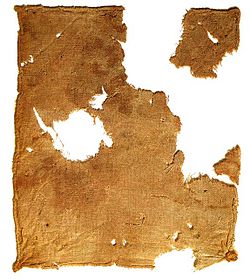
* See an linen cloth found in a Qumran cave to the right.
* "he answered" -The Lord answered through the ephod and then through the priests lips. The use of the ephod is believed to only give "yes" and "no" answers, not complete sentences. The priest must have turned the "yes" into the long response recorded here.
* Philippians 4:12-13 "I know what it is to be in need, and I know what it is to have plenty. I have learned the secret of being content in any and every situation, whether well fed or hungry, whether living in plenty or in want. I can do everything through him who gives me strength."
>9. Who did the Lord send to help David (30:9-16)
* 1 Samuel 30:9-16 "David and the six hundred men with him came to the Besor Ravine, where some stayed behind, for two hundred men were too exhausted to cross the ravine. But David and four hundred men continued the pursuit. They found an Egyptian in a field and brought him to David. They gave him water to drink and food to eat-- part of a cake of pressed figs and two cakes of raisins. He ate and was revived, for he had not eaten any food or drunk any water for three days and three nights. David asked him, "To whom do you belong, and where do you come from?" He said, "I am an Egyptian, the slave of an Amalekite. My master abandoned me when I became ill three days ago. We raided the Negev of the Kerethites and the territory belonging to Judah and the Negev of Caleb. And we burned Ziklag." David asked him, "Can you lead me down to this raiding party?" He answered, "Swear to me before God that you will not kill me or hand me over to my master, and I will take you down to them." He led David down, and there they were, scattered over the countryside, eating, drinking and reveling because of the great amount of plunder they had taken from the land of the Philistines and from Judah."
* "Besor Ravine" -Five miles (8km) south of a suspected site of Ziklag is the Wadi esh-Sheriah.
* "too exhausted to cross the ravine" -The three day forced march and anguish of soul was to much for one third of the men.
* "They found an Egyptian in a field" -Who when going on a mission or mercy and rescue while obeying the Lord would stop to help someone? David. David couldn't have believed that this one man could help him. He stopped out of the mercy and love in his heart. Such love is how David collected so many loyal followers.
* "three days and three nights" -The terrorists struck when David was the farthest away.
* "My master abandoned me" -Slaves are considered less value than a crippled horse.
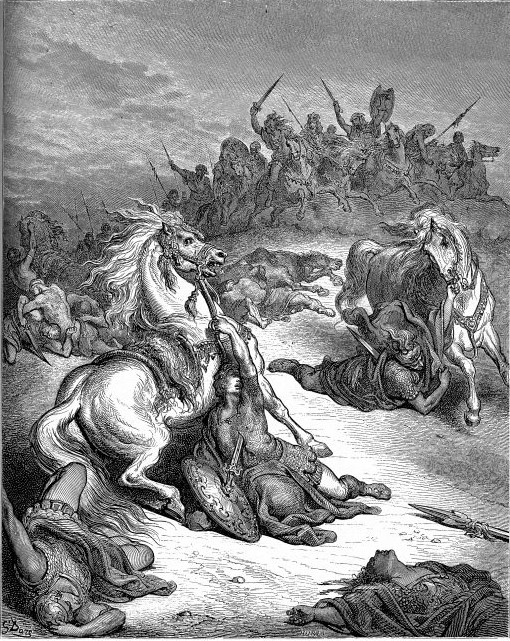
* See a wood engraving by Gustave Dore (1832-1883) to the right depicting the death of Saul. Dore's drawings were in Bibles that are now in public domain. This one was scanned in by creationism.org.
>How did the Lord bless David's faith? (30:17-20)
* 1 Samuel 30:17-20 "David fought them from dusk until the evening of the next day, and none of them got away, except four hundred young men who rode off on camels and fled. David recovered everything the Amalekites had taken, including his two wives. Nothing was missing: young or old, boy or girl, plunder or anything else they had taken. David brought everything back. He took all the flocks and herds, and his men drove them ahead of the other livestock, saying, "This is David's plunder."
* "dust until the evening of the next day" -The battle was intense.
* "four hundred" -David's men must have been out numbered.
* "nothing was missing" -Thus showing that David was still in the favor of the Lord.
>How did David counter the evildoers among his troops? (30:21-25)
* 1 Samuel 30:21-25 "Then David came to the two hundred men who had been too exhausted to follow him and who were left behind at the Besor Ravine. They came out to meet David and the people with him. As David and his men approached, he greeted them. But all the evil men and troublemakers among David's followers said, "Because they did not go out with us, we will not share with them the plunder we recovered. However, each man may take his wife and children and go." David replied, "No, my brothers, you must not do that with what the Lord has given us. He has protected us and handed over to us the forces that came against us. Who will listen to what you say? The share of the man who stayed with the supplies is to be the same as that of him who went down to the battle. All will share alike." David made this a statute and ordinance for Israel from that day to this."
* "He has protected us" -David gave credit to the Lord.
* "a statute and ordinance for Israel" -David's wisdom is seen hear. The Lord gives wisdom to those he wants.
>What did David call the plunder and what did he do with some of it? (30:26-31)
* 1 Samuel 30:26-31 "When David arrived in Ziklag, he sent some of the plunder to the elders of Judah, who were his friends, saying, "Here is a present for you from the plunder of the Lord's enemies." He sent it to those who were in Bethel, Ramoth Negev and Jattir; to those in Aroer, Siphmoth, Eshtemoa and Racal; to those in the towns of the Jerahmeelites and the Kenites; to those in Hormah, Bor Ashan, Athach and Hebron; and to those in all the other places where David and his men had roamed."
* The people David gave some of the plunder to were the same ones that he had lived with all the years being chanced by Saul. They had showed him kindness. He repaid the kindness.
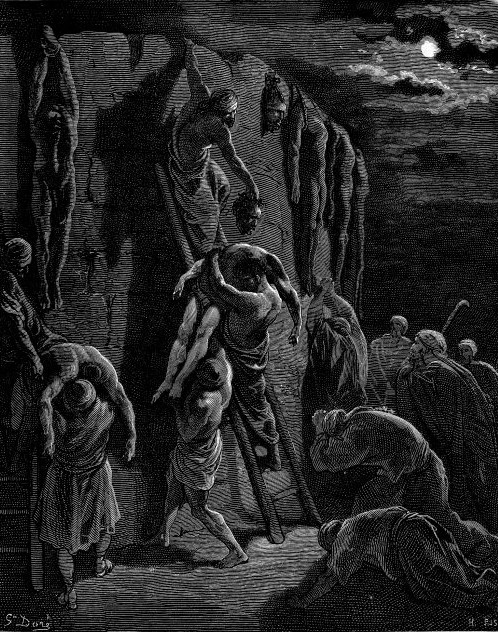
* See a drawing of the men Jabesh Gilead removing Saul's body from the wall.
>10. What happened to Saul, his sons and to Israel in the big battle with the Philistines? (31:1-13)
* 1 Samuel 31:1-13 "Now the Philistines fought against Israel; the Israelites fled before them, and many fell slain on Mount Gilboa.
2 The Philistines pressed hard after Saul and his sons, and they killed his sons Jonathan, Abinadab and Malki-Shua.
3 The fighting grew fierce around Saul, and when the archers overtook him, they wounded him critically.
4 Saul said to his armor-bearer, "Draw your sword and run me through, or these uncircumcised fellows will come and run me through and abuse me." But his armor-bearer was terrified and would not do it; so Saul took his own sword and fell on it.
5 When the armor-bearer saw that Saul was dead, he too fell on his sword and died with him.
6 So Saul and his three sons and his armor-bearer and all his men died together that same day.
7 When the Israelites along the valley and those across the Jordan saw that the Israelite army had fled and that Saul and his sons had died, they abandoned their towns and fled. And the Philistines came and occupied them.
8 The next day, when the Philistines came to strip the dead, they found Saul and his three sons fallen on Mount Gilboa.
9 They cut off his head and stripped off his armor, and they sent messengers throughout the land of the Philistines to proclaim the news in the temple of their idols and among their people.
10 They put his armor in the temple of the Ashtoreths and fastened his body to the wall of Beth Shan.
11 When the people of Jabesh Gilead heard of what the Philistines had done to Saul,
12 all their valiant men journeyed through the night to Beth Shan. They took down the bodies of Saul and his sons from the wall of Beth Shan and went to Jabesh, where they burned them.
13 Then they took their bones and buried them under a tamarisk tree at Jabesh, and they fasted seven days."
* 1 Chronicles 10:13-14 "Saul died because he was unfaithful to the Lord; he did not keep the word of the Lord and even consulted a medium for guidance, and did not inquire of the Lord. So the Lord put him to death and turned the kingdom over to David son of Jesse."
* Those who committed suicide (though for different reasons) in the Bible: Saul, Saul's sword bearer, Absalom's advisor, and Judas.
* All of us should finish the race in faith.
* All Israel suffered because of Saul.
* The people of Gilead honored Saul because of his help during Saul's early kingship.
* Saul had been called from ordinary life to be the first king of Israel. The only extraordinary attribute he had was that he was taller than most. He was not a man of faith. He was the type of man Israel wanted when they asked the Lord to give them a king like the other nations.
Saul was unfaithful to the Lord (13). He did not keep the word of the Lord (13). He did whatever he believed was best for himself. From a human point of view, he was successful. Yet his character shortcomings led him to pursue unwise things.
Saul did not pray (14). He did not seek the Lord. He even consulted a medium for guidance (13; 1 Sam. 28:3-15). His lack of faith and trust in the Lord led to his suicide (4).
Life gets hard often. There are times that all looks so unbearable. It seems waves of despair and disaster endlessly pound on us like waves coming to a hurricane beach. We feel worthless. We give want to give up. It is times like these that a soul's character is tested. Will I trust God? Will I believe in his grace and mercy? Will I do the right thing? Saul did not do the right thing because he relied on himself. He had not made himself a custom to seeking God in all situations, whether bad or good. When tested he sank in his self-reliance.

|























